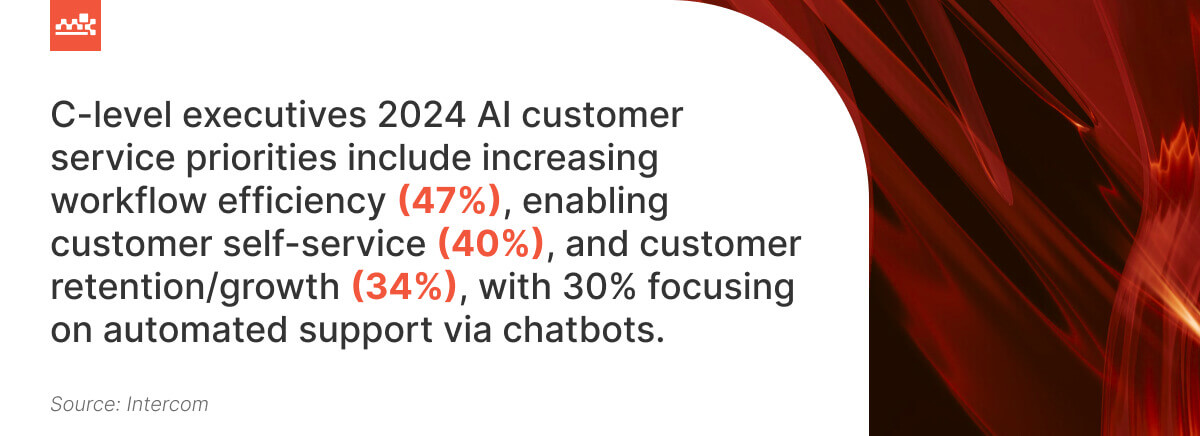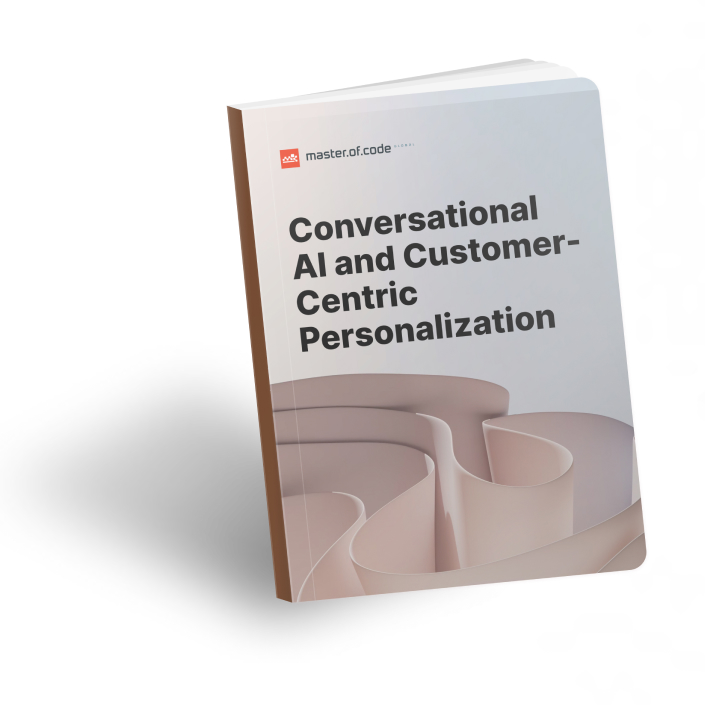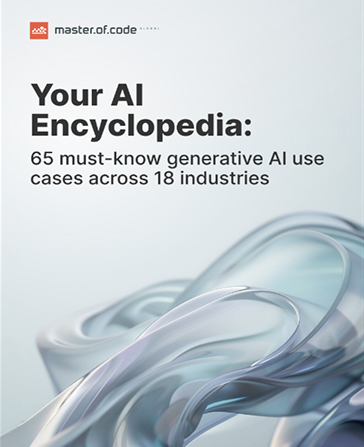One of the primary challenges enterprises face today is delivering the highest level of service. With the ever-increasing clients’ demands, businesses have to continuously seek more efficient tools and technologies. A standout in this pursuit is undoubtedly AI customer support.

Thanks to ongoing advancements in artificial intelligence, companies can better prepare for the future of client care. Interestingly, 82% of executives are reevaluating their consumer experience (CX) strategies in light of recent technological progress.
In this comprehensive guide on AI in customer service (CS) statistics, we will delve into the limitations and opportunities presented by this technology. Let’s also examine its real business value and discuss what tomorrow may hold for CS with artificial intelligence in place.
Table of Contents
The Business Perspective on AI in Customer Service
How do client support professionals perceive the impact of artificial intelligence?
According to the Hubspot research:
- 79% of CS specialists value AI/automation for their strategy. This includes 56% in B2B and 54% in B2C sectors.
- 62% say the technology aids in understanding buyers.
- 78% state that it helps focus on crucial job aspects.
- 71% report AI increases time spent on enjoyable work duties.
- 78% feel automation enhances their efficiency in roles.
- 75% say it improves collaboration and data sharing.

What are business leaders’ expectations of AI in customer engagement?
According to the report by LivePerson:
- 84% of executives use the technology to interact with clients.
- 88% think automated systems for quick resolutions boost user loyalty.
- 91% of businesses are positive about using AI for consumer engagement.
- 96% believe Generative AI will enhance customer interactions.
Companies also consider artificial intelligence as a solution for other multiple challenges:
- 67% for faster information or answers.
- 62% to reduce wait times.
- 53% for more accurate data.
- 42% to create consistent experiences.
- 41% for personalized responses.
- 28% to lower operational costs.
Understanding AI Through the Consumer Lens
What is the general sentiment of customers towards artificial intelligence in business interactions?
- 73% of clients in 2024 are more critical of commercial communication than in previous years.
- 50% of them view AI-powered relations with companies positively.
- 61% of new buyers choose faster AI-produced responses over waiting for a human agent.
In what areas do customers prefer using AI in their interactions with businesses?
- Preferences include: 39% for finding products, 49% for tracking deliveries, 29% for making payments, 26% for purchases, 35% for canceling services, 26% for booking flights, 40% for appointments. and 22% for loan applications.
- 50% believe the technology will enhance customer-enterprise relationships in 1-5 years.
How does artificial intelligence influence the relationship dynamics between businesses and their audience?
Shoppers favor businesses whose AI is: 73% managed by humans, 68% built to standard solutions, 68% limiting bias, 62% able to complete purchases, 53% making product/service predictions, and 37% capable of emotional connections.
The Use of Artificial Intelligence in Client Support Applications
What is the current level of AI adoption among CS teams?
- Nearly half of the client support units have implemented the technology, with additional investments planned for 2024.
- 52% of contact centers have invested in Conversational AI and 44% plan to adopt it.

What are the top AI use cases in customer service?
Popular applications in client care include routing requests (29%), analyzing feedback (28%), and chatbots or self-service tools (26%).
What are the primary objectives businesses seek to achieve by implementing AI in contact centers?
- Companies using artificial intelligence aim to enhance CS (62%), streamline workflows (42%), boost satisfaction (36%), and reduce wait times (33%).
- 83% of organizations are transforming CX for measurable outcomes, with 41% updating or launching Generative AI, virtual assistants, and bots.
Which automation tools do businesses prioritize for CS automation?
- 25% are eager to start employing the technology for routing to the right representative.
- 21% wish to implement AI self-service mechanisms for independent client solutions.
- 20% aim to use artificial intelligence for collecting and analyzing customer feedback.
- Another 20% are interested in instruments that sort requests by urgency.
How are bots and Generative AI being utilized in customer service?
- Customer support chatbots, as a leading artificial intelligence tool, improve digital journeys for 84% of users, with 46% offering a more personalized experience.
- Most B2B and B2C service specialists find Gen AI aids in personalizing responses, with 48% being confident in its accuracy.
- Business leaders also use the technology for process optimization (68%) and enhanced data and analytics capabilities (49%).
AI Customer Service Statistics Across Industries

Retail
- 63% of retailers use AI to improve customer interactions, with 40% dedicating teams and budgets to the technology.
- Consumers see its biggest benefit in promoting price-sensitive shopping (28%) due to global cost-of-living pressures.
- Other key areas: 23% in loyalty and personalized rewards, 23% in online product discovery, 19% in item validation, and 19% in AI-customized recommendations.
- 57% of buyers are comfortable with AI in eCommerce for their journey if businesses maintain transparency.
Banking and Finance Sector
- 46% of financial institutions using artificial intelligence have reported improved customer experience.
- 79.5% plan to increase CX technology investment with a focus on the technology for digital service improvement (58.5%), and enabling self-service for basic (47%) and complex needs (42%).
- Future AI investments include analyzing contact center data for insights (82.5%), optimizing chatbots (72.5%), and virtual client assistants for self-service (65.5%).
Healthcare
According to Deloitte:
- Over 70% of patients believe artificial intelligence could revolutionize care delivery and their experience.
- They use AI in health and wellness: 19% for learning about medical conditions, 16% for understanding treatments, and 15% for decoding technical language and enhancing well-being.
- 69% of users rate the provided information as very or extremely reliable.
Telecommunications
- 97% of communications service providers report Conversational AI positively impacts customer satisfaction.
- 91% of executives foresee digitized, automated workflows by 2026, with telecom leaders highlighting its high value for client experiences.
- AI-powered chatbots allow 82% of users to access services without long waits.
- 56% of customers prefer self-service for plan selection; 77% use it for bill payments and recharges.
- Personalization in telecom leads to 5-15% revenue growth, aided by digital assistants.
Benefits of Artificial Intelligence in Client Care

What are the major benefits of implementing AI in customer service roles?
- 36% of experts highlight AI’s role in ensuring 24/7 CS availability.
- 31% appreciate it for saving time and automating manual tasks.
- 30% note this technology helps in responding faster to client support requests, reducing handling time.
- 28% find it handles minor duties, freeing them for complex issues.
- 25% feel artificial intelligence enhances the effectiveness of addressing consumer queries.
- Report an average daily time saving of 2 hours and 20 minutes using chatbots.
- 84% see it simplifies ticket response, with 64% noting increased personalization in correspondences.
- Implementing helpdesk software helps resolve as much as 22% of all service desk tickets for free through automation.
What are the impacts of AI-based applications in contact centers?
- 91% of businesses with artificial intelligence in support units are satisfied with the effects. Moreover, 56% of teams feel more optimistic about the technology enhancing their success compared to last year.
- Key advantages include improved consumer service (69%), decreased wait times (55%), and streamlined workflows (54%). Other benefits are enhanced customer satisfaction (48%) and better use of data and analytics (41%).
- Conversational AI and chatbots have boosted CS specialist’s productivity (94%), sped up issue resolution (92%), and reduced agent effort (87%). Plus, 65% report lowered costs due to higher efficiency.
- Over half (53%) say these capabilities have reduced overall operational costs in their AI-based call centers.
- 40% of support units introduced agent assist, making it the leading AI-powered application. They witnessed a 27% reduction in average handle time with it.
- Among those measuring the tool’s impact, 34% see revenue increase, 40% in client ratings, and 32% in team members productivity. Organizations pairing agents with virtual assistants handle 7.7% more simultaneous chats. Additionally, the combination results in an average of $4.3 million in staffing cost savings.
Concerns and Challenges with AI in Customer Service
What are the main barriers to using artificial intelligence in CS?
- 45% cite maintaining a personalized experience as a challenge.
- 40% point to occasional inaccuracies in AI tool outputs.
- 32% face difficulties integrating such instruments with existing data and systems.

Why are consumers and support specialists hesitant about businesses using AI?
- 44% of clients prefer interaction with agents over AI, and 36% find it less personal than human service.
- 30% of enterprises don’t want to become overly dependent on the technology; 23% mention cost considerations.
- 39% of CS units worry about artificial intelligence replacing their jobs in the next few years.
- 55% of support teams believe instruments like ChatGPT can provide incorrect information, with only 42% confident in detecting such hallucinations.
What are the perspectives on the transparency of AI use in customer support?
- Over 90% of businesses and consumers agree on the importance of disclosing the use of artificial intelligence in client care.
- 77% of companies and 73% of buyers favor human monitoring of AI. Furthermore, shoppers are more inclined to buy from firms that oversee its usage.
The Future of AI in Customer Support
What are the main predictions and expectations for artificial intelligence this year and beyond?
- By 2024, most businesses believe AI/automation will assist in various roles, including built-in software, Generative AI, and chatbots.
- 49% of CS professionals already using it think it will independently handle most customer service tasks by 2024. Moreover, 61% agree the majority of specialists will employ the technology in their role.
- Over half of Americans (52.4%) are also optimistic about artificial intelligence improving CS. Anticipations include 24/7 assistance (34.7%), no wait times (19.5%), and reduced phone communication.

- AI investment trends: 20% of C-level client care execs significantly invested in the technology in 2023, with 70% planning more in 2024. Top funding areas for support teams: AI-powered bots (44%), user behavior analysis (42%), and knowledge base enhancement (29%).
- Forrester predicts that 60% of skeptics will use Gen AI in 2024, knowingly or not.
- Gartner forecast: By 2026, Conversational AI for customer service will reduce contact center labor costs by $80 billion.
Conclusion
Artificial intelligence is a transformative force, offering businesses a complete reinvention of customer interactions. As consumer expectations grow, using AI development services becomes necessary for maintaining a competitive edge. The insights gathered in our article clearly indicate the growing importance of technology in boosting CX. Thus, the question isn’t if AI should be part of your strategy, but rather how quickly and effectively you can integrate it.
Are you prepared to employ AI’s extensive capabilities in your client care framework? Reach out to us, and let’s collaborate to transform your customer service approach, establishing new industry standards together.
Don’t miss out on the opportunity to see how AI can boost your customer support and raise client satisfaction.
Explore how AI voice agents enhance call center operations.







